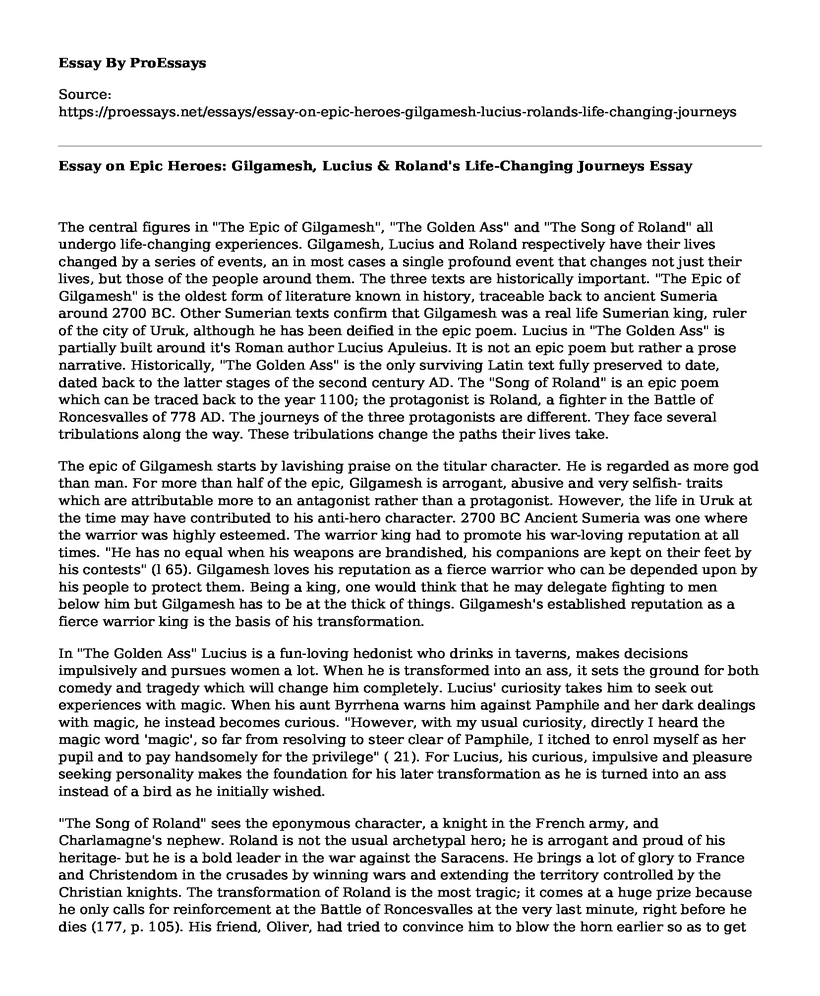The central figures in "The Epic of Gilgamesh", "The Golden Ass" and "The Song of Roland" all undergo life-changing experiences. Gilgamesh, Lucius and Roland respectively have their lives changed by a series of events, an in most cases a single profound event that changes not just their lives, but those of the people around them. The three texts are historically important. "The Epic of Gilgamesh" is the oldest form of literature known in history, traceable back to ancient Sumeria around 2700 BC. Other Sumerian texts confirm that Gilgamesh was a real life Sumerian king, ruler of the city of Uruk, although he has been deified in the epic poem. Lucius in "The Golden Ass" is partially built around it's Roman author Lucius Apuleius. It is not an epic poem but rather a prose narrative. Historically, "The Golden Ass" is the only surviving Latin text fully preserved to date, dated back to the latter stages of the second century AD. The "Song of Roland" is an epic poem which can be traced back to the year 1100; the protagonist is Roland, a fighter in the Battle of Roncesvalles of 778 AD. The journeys of the three protagonists are different. They face several tribulations along the way. These tribulations change the paths their lives take.
The epic of Gilgamesh starts by lavishing praise on the titular character. He is regarded as more god than man. For more than half of the epic, Gilgamesh is arrogant, abusive and very selfish- traits which are attributable more to an antagonist rather than a protagonist. However, the life in Uruk at the time may have contributed to his anti-hero character. 2700 BC Ancient Sumeria was one where the warrior was highly esteemed. The warrior king had to promote his war-loving reputation at all times. "He has no equal when his weapons are brandished, his companions are kept on their feet by his contests" (l 65). Gilgamesh loves his reputation as a fierce warrior who can be depended upon by his people to protect them. Being a king, one would think that he may delegate fighting to men below him but Gilgamesh has to be at the thick of things. Gilgamesh's established reputation as a fierce warrior king is the basis of his transformation.
In "The Golden Ass" Lucius is a fun-loving hedonist who drinks in taverns, makes decisions impulsively and pursues women a lot. When he is transformed into an ass, it sets the ground for both comedy and tragedy which will change him completely. Lucius' curiosity takes him to seek out experiences with magic. When his aunt Byrrhena warns him against Pamphile and her dark dealings with magic, he instead becomes curious. "However, with my usual curiosity, directly I heard the magic word 'magic', so far from resolving to steer clear of Pamphile, I itched to enrol myself as her pupil and to pay handsomely for the privilege" ( 21). For Lucius, his curious, impulsive and pleasure seeking personality makes the foundation for his later transformation as he is turned into an ass instead of a bird as he initially wished.
"The Song of Roland" sees the eponymous character, a knight in the French army, and Charlamagne's nephew. Roland is not the usual archetypal hero; he is arrogant and proud of his heritage- but he is a bold leader in the war against the Saracens. He brings a lot of glory to France and Christendom in the crusades by winning wars and extending the territory controlled by the Christian knights. The transformation of Roland is the most tragic; it comes at a huge prize because he only calls for reinforcement at the Battle of Roncesvalles at the very last minute, right before he dies (177, p. 105). His friend, Oliver, had tried to convince him to blow the horn earlier so as to get reinforcements. However, Roland proud and with a penchant to do things in his own way, had not heeded his friend's valuable advice.
Works Cited
Burgess, Glyn Sheridan, ed. The Song of Roland. Penguin Classics, 1990.George, Andrew. "The epic of Gilgamesh. A new translation." (1999).
Kenney, E. J. (Ed.). (1998). The Golden Ass. Penguin UK.
Cite this page
Essay on Epic Heroes: Gilgamesh, Lucius & Roland's Life-Changing Journeys. (2023, Jan 03). Retrieved from https://proessays.net/essays/essay-on-epic-heroes-gilgamesh-lucius-rolands-life-changing-journeys
If you are the original author of this essay and no longer wish to have it published on the ProEssays website, please click below to request its removal:
- Essay Sample on Personification in Literature
- Poetry in Romantic Songs Essay
- "The Yellow Wallpaper": Suppression of Women in 19th Century and Escape
- Essay Example on Interpretation of a Fiction Story: A Rose for Emily
- Anger and Social Disconnect in "A Hunger Artist" and "Barn Burning"
- Women and Power in Gilgamesh, Ramayana and the Odyssey - Essay Sample
- Bedford Literature of the American Slave History Before 1865 Essay Example







